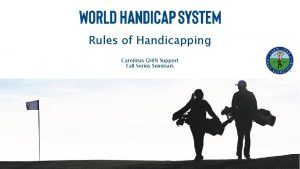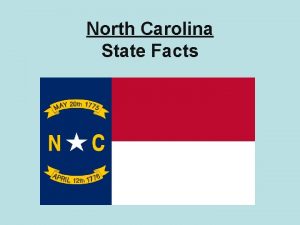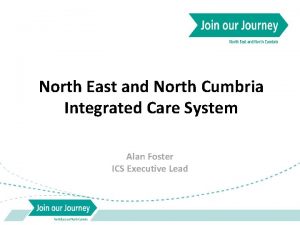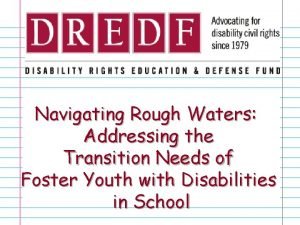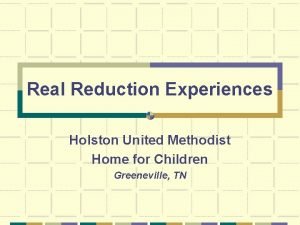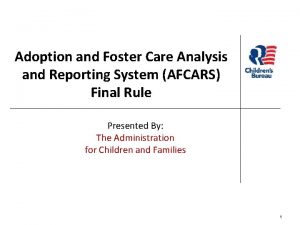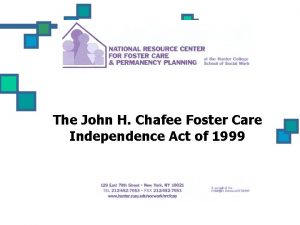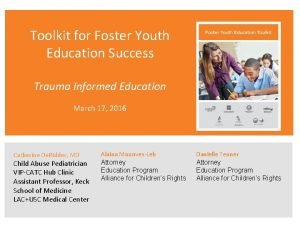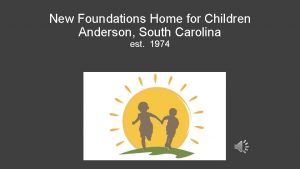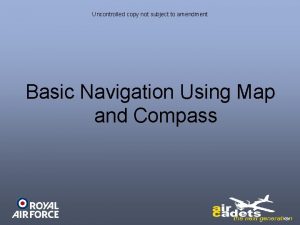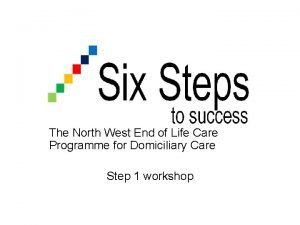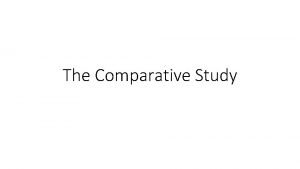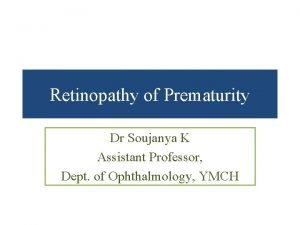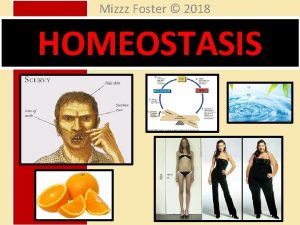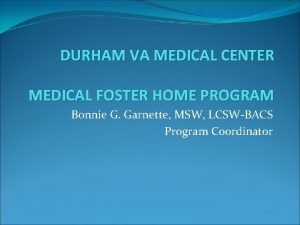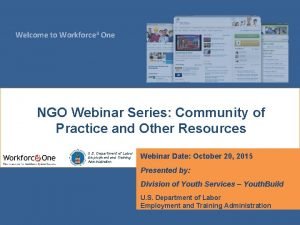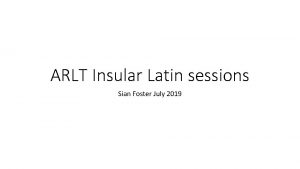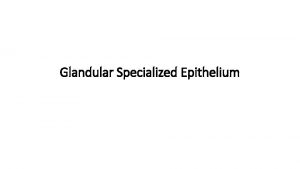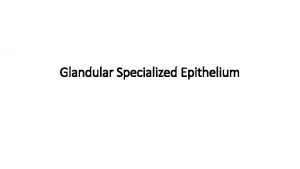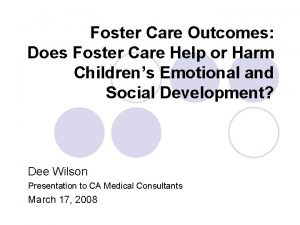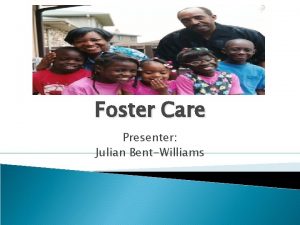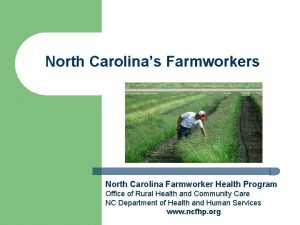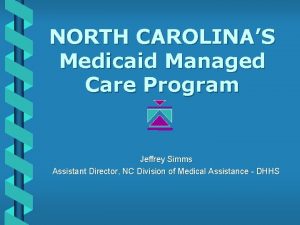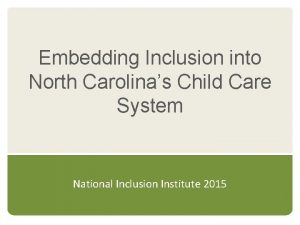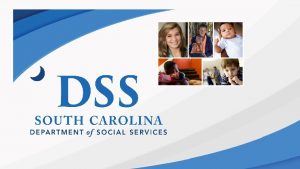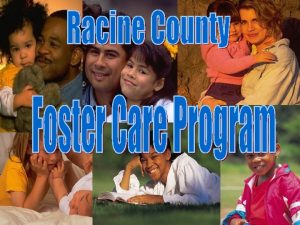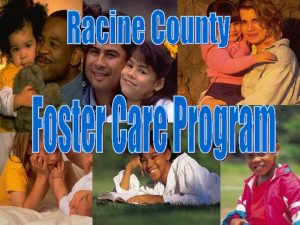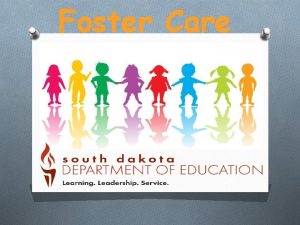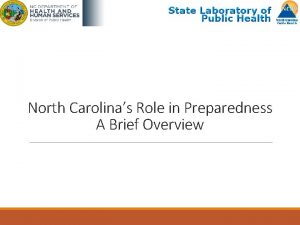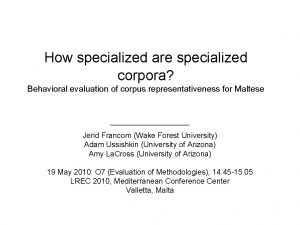Overview of North Carolinas Specialized Foster Care Plan































- Slides: 31

Overview of North Carolina’s Specialized Foster Care Plan February 2021

Agenda Overview Key Features of the Specialized Foster Care Plan (FC Plan) Next Steps UPDATE ON THE SPECIALIZED FOSTER CARE RFP| FEBRUARY 2021 2

Overview

A Closer Look at Children in Foster Care in the State Total number of children in foster care who meet BH I/DD Tailored Plan (TP) eligibility criteria = = ~31, 000 23% of children in foster care eligible for BH I/DD TP enrollment* ~7, 000 In SFY 2018, 105 children in foster care were in the Innovations waiver. *Based on January 2021 data analysis UPDATE ON THE SPECIALIZED FOSTER CARE RFP| FEBRUARY 2021 4

FC Plan Approach to Addressing Current Challenges Disruptions in care and provider continuity due to population’s frequent placement changes Foster Care Plan Requirements • • • Lack of clarity in coordination responsibilities and role delineation between entities related to locating and paying for certain services • Information exchange challenges between entities impedes timely access to care • • Serves statewide Must adhere to transition of care policy when child experiences change in placement Extended transitional period (180 days) requirements to maintain provider, medication, and ongoing course of treatment when child moves to FC Plan from another plan Assignment of plan-level care manager to support transitions for all FC Plan members (not just high-risk members) Must accept “any willing provider” for all provider types Single point of accountability for integrating delivery of physical and behavioral health services and implementing a System of Care framework Mandates for coordination with DSS (e. g. , initial mtg with 72 hours of member enrollment; monthly check-ins; information-exchange requirements; and co-location at DSS; MOAs with DSS will further delineate roles and responsibilities including responsibilities for payment for placement vs. treatment) Expedited care management timeframes: • Initial meeting with member within 72 hours of plan enrollment • Assessment of child’s needs: 14 days high-risk members/30 days all others • Development of a care plan: within 7 days following assessment for high-risk members/within 14 days for all others Requirement to assist in scheduling DSS-required 7 and 30 day assessments Requirement to include Child and Family Teams in care meetings UPDATE ON THE SPECIALIZED FOSTER CARE RFP| FEBRUARY 2021 5

FC Plan Approach to Addressing Current Challenges Foster Care Plan Requirements Challenges meeting the needs of children/youth in foster care with complex physical and behavioral health or I/DD needs, resulting in restrictive residential or out-of-state placements • Limited focus on addressing the unique challenges of children in foster care as part of service delivery • Limited array of available community-based services across the state to support children remaining in family settings or the least restrictive setting possible • • Add-on payment for providers, including PCP, BH, and I/DD, to attend treatment team meetings Covers High Fidelity Wrap and ACT care management models, while still retaining responsibility for care coordination with DSS and other care coordination functions Mandates for in-reach and transition of care requirements for children/youth in institutional settings to support placement in least restrictive setting Key personnel must have (1) trauma-informed care experience, (2) knowledge of the population’s unique health care needs, and (3) and familiarity with state agencies involved in members’ care Providers should receive on-going training by Plan to identify and address ACEs and provide trauma-informed care Care plan manager will screen for ACEs Quality and reporting requirements focus on reducing disparities among the foster care population In Lieu of and Value-added services Implement system changes recommended by DHHS workgroup UPDATE ON THE SPECIALIZED FOSTER CARE RFP| FEBRUARY 2021 6

FC Plan Benefits for Members—Guiding Principles • Deliver seamless, person-centered care focused on promoting long-term well-being • Support members’ unique needs, including behavioral health needs and Adverse Childhood Experiences (ACEs), by supporting members’ access to a diverse of array of providers with specialized experience and training located throughout the State • Pair each member with a plan-based care manager charged with facilitating coordination and collaboration among a member’s care team and promoting delivery of whole-person care • Advance members’ permanency planning goals by ensuring the FC Plan, DSS and other entities involved in promoting the health of members closely coordinate with one another and directly with members • Minimize members’ disruptions in placement and provide support during transitions (including between placements, when aging out, and during and after reunification) by promoting continuity of care through a trauma-informed lens • Provide members with access to high-quality care that promotes health equity and reduces racial and ethnic disparities in outcomes • Improve members’ outcomes by continuously monitoring care delivery against a robust set of quality standards and regular reporting UPDATE ON THE SPECIALIZED FOSTER CARE RFP| FEBRUARY 2021 7

Key Features of the FC Plan

Key Design Areas for Discussion Today Eligibility & Enrollment Benefits Care Management Quality Provider Contracting and Network Adequacy UPDATE ON THE SPECIALIZED FOSTER CARE RFP| FEBRUARY 2021 9

E&E Benefits Care Management Quality Provider Contracting Eligibility & Enrollment Eligibility for FC Plan o o Children and youth in foster care Former foster youth who aged out of care up to age 26 Children receiving Title IV-E adoption assistance Children of individuals eligible for FC Plan enrollment Enrollment in FC Plan o o The Department will automatically enroll eligible beneficiaries into the FC Plan at launch with some exceptions: Innovations or TBI waiver enrollees; beneficiaries residing in ICFs; those eligible for TCLI; and Tribal members (who may opt in) Following FC Plan launch, beneficiaries enrolled in a SP or TP who become eligible for the FC Plan will be transferred to the FC Plan members will be able to transfer to a SP, TP (if eligible) or Tribal Option (if eligible) at any point during the coverage year Children who leave foster care will have the option to remain in the FC Plan for the duration of the coverage year and be given the option to remain in the Plan for a subsequent coverage year *Legislative changes and system modifications required to effectuate the E&E design UPDATE ON THE SPECIALIZED FOSTER CARE RFP| FEBRUARY 2021 10

E&E Benefits Care Management Quality Provider Contracting Benefits Overview The FC Plan will include nearly all Standard Plan and BH I/DD TP services, except for the following which will only be covered by BH I/DD TPs: o o o ICF-IIDs Respite services through TRACK at Murdoch Innovations waiver services TBI waiver services State-funded Services provided through the Transitions to Community Living Initiative FC Plan will pay for Medicaid covered services (e. g. , treatment-related placement); DSS will continue to comply with federal and state provisions to cover non-Medicaid, foster-care related services (e. g. , non-treatment related placement, room and board) UPDATE ON THE SPECIALIZED FOSTER CARE RFP| FEBRUARY 2021 11

E&E Benefits Care Management Quality Provider Contracting Care Management Model All members enrolled in the FC Plan will have access to a robust care management model administered by the FC Plan in close coordination with DSS Key Model Features o Provide care management to all members. Plan assigns each member a Plan-based Care Manager within 24 hours of the Plan being notified about a member’s enrollment; unlike SP/TP, care managers employed by health plan vs. AMH/AMH+/CMA o Deliver whole person, integrated care. Care Manager will be responsible for managing each member’s physical and behavioral healthcare and unmet health-related resources needs across healthcare settings and foster care placements o Coordinate/Co-locate with DSS. Care Managers will be required to coordinate closely with each member’s assigned DSS case worker; the FC Plan will be required co-locate a share of Care Managers in DSS agencies throughout North Carolina o Build Upon TP Health Home Model. The model will include robust care management requirements similar to those established under the Tailored Care Management Model (e. g. , comprehensive assessment, care planning, interdisciplinary care teams, minimum care management contact requirements), with requirements augmented and tailored to address the unique needs of the foster care population UPDATE ON THE SPECIALIZED FOSTER CARE RFP| FEBRUARY 2021 12

E&E Benefits Care Management Quality Provider Contracting Care Management Model, cont. Key Model Features o Support continuity of care. Care Manager will ensure continuity of care for beneficiaries in an active course of treatment during transitions between delivery systems/Plans, treatment settings (e. g. , following discharge from institutional setting or ED visit) and/or foster care placements; Care Manager must proactively develop a crisis plan for each member. o Support members transitioning to adulthood. Care Manager must support transition planning for members aging out of the child welfare system as well as aging out of Medicaid coverage at age 26. o Oversee medication management services. Care manager will be responsible for ensuring member has access to needed medications on an on-going basis and during transitions; the Care Manager must also coordinate with providers to ensure appropriate use and monitoring of psychotropic medications. 13 UPDATE ON THE SPECIALIZED FOSTER CARE RFP| FEBRUARY 2021

E&E Benefits Care Management Quality Provider Contracting Care Management Timeframes Requirement Share FC Plan enrollment packet with Member, including information on Care Manager assignment Conduct initial meeting between Care Manager and DSS Child Welfare Worker Initiate contact with Member to start the Comprehensive Assessment Complete initial Care Plan/ISP (note: the FC Plan must not withhold services pending completion of the Care Plan/ISP) Update Care Plan/ISP Document/store and make Care Plan/ISP available to Member Convene Child and Family Team (for children with a mental health disorder/SUD who are receiving MH/SUD services) Recommended Timeframe • At initial FC plan launch: 30 days prior to FC Plan launch • After plan launch: within 14 days of enrollment • At Initial FC Plan launch: Within 60 days of enrollment, or earlier, if necessary to appropriately manage the Member’s healthcare needs (meeting may be telephonic, if necessary) • Ongoing: Within 72 hours of enrollment, or earlier, if necessary to appropriately manage the Member’s healthcare needs (meeting may be telephonic, if necessary) Within 7 days of FC Plan enrollment, or earlier, if necessary to appropriately manage the Member’s healthcare needs • High-risk members: Within 14 days of FC Plan enrollment • Other members: Within 30 days of FC Plan enrollment • High-risk members: Within 7 days of the completion of the comprehensive assessment • Other members: Within 14 days of the completion of the comprehensive assessment • At minimum every 12 months • Within 14 days of re-assessment Within 24 hours of completion At least once every 30 days Ensure post-partum visit with physician Within 56 days of delivery Follow up with Member after inpatient/ED discharge Within 48 hours Arrange outpatient follow-up visit after inpatient/ED discharge Within 7 days, unless a shorter timeframe is required Comprehensive Assessment/reassessment following Within 14 days inpatient/ED discharge Update Care Plan/ISP following inpatient/ED discharge Within 14 days of Comprehensive Assessment/reassessment Reassessment for Members leaving the Child Welfare System Within 90 days of Member leaving the Child Welfare System but remaining enrolled in the FC Plan (i. e. , former foster youth) Discuss health insurance options for individuals aging out of Medicaid at age 26 Outreach related to high-risk ADT alert Care Needs Screening for Members who have opted out of care management 90 days prior to the Member’s 26 th birthday Same-day or next-day for all members Within 45 calendar days of FC Plan enrollment UPDATE ON THE SPECIALIZED FOSTER CARE RFP| FEBRUARY 2021 14

E&E Benefits Care Management Quality Provider Contracting Quality Measures Overview • The FC Plan will be required to report robust and dedicated quality measures that prioritize medical needs and experiences that are significant in the FC Plan population. • All quality measures for the FC Plan will align with and build on the Department’s Quality Strategy, which primarily emphasizes outcomes for beneficiaries over process measures. • While many quality measures align between SP, BH I/DD Tailored Plans, and FC Plan, the FC Plan also includes measures that are unique to the FC Plan. • Some examples of unique quality measures in the FC Plan that reflect the health needs of the Plan’s members include: o For children, Use of First-Line Psychosocial Care for Children and Adolescents on Antipsychotics o For adults, Follow-Up After Emergency Department Visit for Alcohol and Other Drug Abuse or Dependence UPDATE ON THE SPECIALIZED FOSTER CARE RFP| FEBRUARY 2021 15

E&E Benefits Care Management Quality Provider Contracting Performance Improvement Projects Overview • The FC Plan must identify and implement interventions to reduce health and quality outcome disparities, including by conducting annual performance improvement projects (PIPs). • The FC Plan will be required to complete at least three PIPs each coverage year, with a minimum of one within each of the following categories: 1. Non-clinical 2. Clinical 3. Transitions and continuity of care • For each PIP category, the FC Plan must select from among the options identified by the Department (see Appendix for a full list of PIPs). • The Department reserves the right to mandate specific PIPs and/or prescribe additional PIPs based on member experience and outcomes. UPDATE ON THE SPECIALIZED FOSTER CARE RFP| FEBRUARY 2021 16

E&E Benefits Care Management Quality Provider Contracting and Network Adequacy o FC Plan network will include physical health, BH, I/DD, and LTSS providers across the State o FC Plan network will accept “any willing provider” for all provider types and robust provider quality standards o The FC Plan must meet network adequacy requirements which generally align with SP and TP time/distance requirements. o Where SP or TP network adequacy requirements for a certain provider type were based on a regional construct, the FC Plan must meet a minimum statewide contracting standard for that provider type but have flexibility to propose an alternative approach o The FC Plan must ensure network providers receive training on trauma-informed care and ACEs to understand the needs of the population served by the Plan UPDATE ON THE SPECIALIZED FOSTER CARE RFP| FEBRUARY 2021 17

Timeline for FC Planning & Launch DHHS release policy document Feb. 2021 FC Plan responses due by Mid to Late Summer 2021* DHHS issues FC Plan RFP Spring, 2021 DHHS awards FC Plan contract by Fall 2021 FC Plan impleme ntation planning FC Plan design & Stakeholder Feedback Oct 2020 Nov 2020 Dec 2020 Jan 2021 Feb 2021 Mar 2021 Apr 2021 May 2021 June 2021 July 2021 TP RFA issuance and contract award TP RFA responses due by February 2, 2021 Aug 2021 Sep 2021 July 2022 SP operational SP implementation planning DHHS released TP RFA November 13, 2020 FC Plan launches July 1, 2022 TP implementation planning DHHS projected award TP contract by June 2021 SP launches July 1, 2021 TP Plan launches July 1, 2022 *Reminder: Either a Standard Plan or BH I/DD Tailored Plan may be awarded the FC Plan UPDATE ON THE SPECIALIZED FOSTER CARE RFP| FEBRUARY 2021 18

Next Steps

Stakeholder Engagement o Ongoing through March o Avenues for Stakeholder Engagement include: o Webinar/Meeting(s) for Local DSSs o Webinar/Meeting(s) with DJJ o Webinar/Meeting with MCAC BH Subcommittee o Webinar and concept paper for consumers, advocates, LME/MCOs, health plans and providers o Seek public comment and incorporate feedback into RFP, as applicable UPDATE ON THE SPECIALIZED FOSTER CARE RFP| FEBRUARY 2021 20

Potential Legislative Changes Needed o o New provision in Article 4 of Chapter 108 D to outline Foster Care Plan Requirements o Plan eligibility – describes populations eligible to enroll in the plan when it becomes operational o Benefits – describes the benefit package to include Standard Plan and BH I/DD TP services (with some exceptions) o Enrollment/Disenrollment o Addresses the start date of coverage for eligible populations o Allows flexibility for enrollees to move to a Standard Plan or BH I/DD TP at any time o Specifies how long an enrollee may remain in the plan in the following circumstances: (1) after leaving foster care while enrolled in the plan or (2) if the enrollee is the minor child of an enrollee o Responsibilities of the Department and the Entity Operating the Plan o Procurement - specifies the entities eligible to bid on the RFP (i. e. only entities holding a Standard Plan or BH I/DD TP contract) Other changes to Chapter 108 D to align with Foster Care Plan Design o Conforming changes to definitions, enrollee requests for disenrollment from PHPs, populations covered by PHPs, number and nature of capitated PHP contracts, and the BH IDD TP authorizing provision to align with the design of the plan UPDATE ON THE SPECIALIZED FOSTER CARE RFP| FEBRUARY 2021 21

Next Steps o Continue to revise the FC Plan RFP o Advance additional stakeholder engagement efforts UPDATE ON THE SPECIALIZED FOSTER CARE RFP| FEBRUARY 2021 22

Questions?

Appendix

Flowchart of Proposed Care Management Model Core Care Team County Child Welfare Agency Foster/ Biological Parents* County Child Welfare Worker • Lead permanency/transition planning efforts • Schedule/complete initial assessments • Coordinate with Plan-Based Care Manager Member enrolled in Medicaid Capitation payments Regular communication/ information sharing Care Manager • Coordinate with DSS Caseworker • Manage member’s healthcare needs Coordination DHHS FC Plan • Assign member Care Manager and PCP • Deliver Medical Home Fees and Medical Team Conference Payments to contracted practices, as appropriate Medical Home Fee FFS “Medical Team Conference” Payment Assigned PCP Other Entities • CDSAs • Schools • Juvenile justice system • Baseline “Medical Home” functions for individuals enrolled in the FC Plan • May receive additional FFS payment for participation in case conferences Non-AMH BH I/DD Provider • May receive additional FFS payment for participation in case conferences *As appropriate 25

Coordination between FC Plan and DSS At every stage, the Care Manager will closely coordinate efforts with a Member’s Child Welfare Worker. Depending on the Member’s placement status and circumstances, the Care Manager must also coordinate efforts with other entities. Care Manager o o o Coordinate closely with County Child Welfare Worker o (including initial meeting with 72 hours of member’s enrollment and ongoing monthly check-ins) Assist Child Welfare Worker with scheduling DSS o health assessments, if necessary Consolidate Member’s medical records Gather/consolidate DSS assessment forms o Coordinate development of crisis plan Lead delivery of core care management functions (e. g. , including comprehensive assessment, care plan/ISP development, care team formation, transitional care management, medication management, addressing unmet health-related resource needs) UPDATE ON THE SPECIALIZED FOSTER CARE RFP| FEBRUARY 2021 County Child Welfare Worker Conduct intake and coordinate DSS-required initial healthcare assessments (with assistance from Care Manager, as needed) Share DSS health assessments with Care Managers and participate in regular meetings to discuss critical member updates Lead foster care placement, permanency planning, and foster care transition planning efforts 26

Continuity of Care During Transitions o FC Plan is required to ensure the continuity of care for beneficiaries in an active course of treatment for a chronic or acute medical or behavioral health condition as children transition from fee-for-service to the FC Plan or from one plan to a different plan. o The Plan will notify the County Child Welfare Worker, foster parents, and biological parents (as appropriate) of a change in plan and provide assistance in selecting a new PCP, if necessary. o Care Manager will be required to: o Develop a crisis plan for each Member o Provide transitional care management (e. g. , discharge planning, facilitating clinical handoffs, and conducting medication management) to members following discharge from a hospital or institutional setting or following an ED visit o Provide in-reach and transition services to certain members admitted to institutional settings in order to identify and engage those who may be able to have their needs met in the community and ensure connections to needed services following discharge o Coordinate closely with the County Child Welfare Worker on transition planning for Members aging out of the child welfare system, including developing a “Health Passport” for each member o Provide support to members aging out of Medicaid coverage at age 26 UPDATE ON THE SPECIALIZED FOSTER CARE RFP| FEBRUARY 2021 27

Comprehensive Medication Management Services Individuals in the child welfare system often face disruptions to their medication regimens; the FC Plan will be required to implement robust medication management processes for this population Requirements o Deliver medication management in accordance with recognized professional guidelines, such as “Best Practices for Medication Management for Children & Adolescents in Foster Care” from the North Carolina Pediatric Society/Fostering o Ensure adequate supply of essential medications during initial member contact o Monitor use of psychotropic medication o Ensure provision of metabolic monitoring for members prescribed antipsychotic medications o Coordinate with the member’s PCP and local pharmacy to ensure access to needed prescriptions and adjust the medication regimen, as appropriate o Leverage FC Plan psychiatrist/pharmacist expertise, as necessary UPDATE ON THE SPECIALIZED FOSTER CARE RFP| FEBRUARY 2021 28

Key Personnel The FC Plan will include applicable key personnel required in Standard Plans and BH I/DD Tailored Plans (e. g. , CEO, CFO) as well as new key leadership positions and credentials specific to the population served by the FC Plan. New Requirements for FC Plan o The FC Plan will be required to fill the following key leadership positions: o Director of Population Health: Responsible for the FC Plan care management model o Pharmacy Director: In addition to managing the FC Plan pharmacy benefits and services, the Pharmacy Director is newly responsible for leading the Plan’s efforts implementing the medication management requirements in accordance with the contract o Deputy Chief Medical Officer: Must be a child and adolescent psychiatrist who supports CMO o Requirements for key personnel were also updated to include: o Experience with trauma-informed care experience, o Knowledge of the unique and complex health care needs of children and youth in foster care, and o Knowledge of the multiple State agencies involved in the care of children and youth in foster care (e. g. , DSS, Department of Public Instruction, Division of Juvenile Justice). UPDATE ON THE SPECIALIZED FOSTER CARE RFP| FEBRUARY 2021 29

Overview of the FC Plan RFP Design Process The FC Plan is designed to address the unique needs of the foster care population and alleviate many of the challenges children and youth involved in the child welfare system face today in receiving seamless, integrated, and coordinated health care. Design Process To meet the unique needs of the FC population, we: o Reviewed other states’ specialty pediatric managed care contracts o Researched best practices for delivering care management services for children in foster care o Documented challenges with existing system; o Engaged with and seeking feedback from DHB, DMH, DSS, local DSSs, external stakeholders o Leveraged SP and TP contract requirements, where appropriate to standardize across NC’s health plans UPDATE ON THE SPECIALIZED FOSTER CARE RFP| FEBRUARY 2021 Where Are We Today? • Revising RFP draft • Wrapping up open design work to address comments/outstanding questions • Seeking to engage diverse stakeholders • Moving into procurement process to prepare RFP for publication 30

E&E Care Management Benefits Quality Provider Contracting Performance Improvement Projects The FC Plan must develop and execute at least one performance improvement project (PIP) annually that falls under the each of the following three categories. Non-Clinical PIPs* 1. Improving timeliness of health assessment completion and care plan development 2. Improving supports to promote diversion, in-reach and/or transition 3. Improving the adequacy of behavioral health network with regards to geographic and virtual accessibility and representation of historically underrepresented groups among network providers 4. Improving educational outcomes and addressing underlying health needs/learning disabilities that contribute to poor school performance 1. Prevention and management of acute and chronic conditions** 2. Identification and management of psychotropic medication prescribing 3. Identification of and treatment for primary diagnosis of PTSD and underlying diagnoses 4. Identification of and care for children with special health care needs 5. Incorporation of traumainformed competence and services, particularly for children/young adults who have a history of abuse/neglect and children/young adults who are at risk for juvenile justice involvement Transitions and Continuity of Care PIPs In Placements 1. Measures taken to conduct regular medical team care conferences that engage all appropriate representatives for the enrollee 2. Coordination with DSS to provide all necessary supports required to enable an enrollee to remain in a placement, provided the placement is safe and suitable 3. Measures taken to mitigate law enforcement involvement in behavioral health crises Between Placements 4. Development of transitional care plans to ensure continuity across placements and institutional settings 5. Processes implemented to conduct regular monitoring and timely face-to-face interactions with enrollees who are temporarily in outof-county or out-of-state placements 6. Mechanisms to involve family and DSS in care plan development and transitional care Transitions Out of Foster Care 7. Measures taken prior to enrollee exiting foster care to reduce risk of adverse outcomes, including justice system involvement and homelessness 8. Measures taken prior to enrollee exiting foster care to ensure successful community integration *The CFC plan must consider how innovative use of care management can contribute to clinical performance improvement in their selected area(s). **Focus areas may include, but are not limited to, the following: asthma; early childhood health and development, including well visits, immunizations, and developmental screenings; tobacco
 Carolinas ghin support
Carolinas ghin support State bird north carolina
State bird north carolina Cumbria and north east ics
Cumbria and north east ics Effects of multiple placements in foster care
Effects of multiple placements in foster care Effects of multiple placements in foster care
Effects of multiple placements in foster care Holston homes foster care
Holston homes foster care Adoption and foster care analysis and reporting system
Adoption and foster care analysis and reporting system How foster children
How foster children Trauma informed care for foster youth
Trauma informed care for foster youth New foundations home for child anderson sc
New foundations home for child anderson sc Levels of care primary secondary tertiary quaternary
Levels of care primary secondary tertiary quaternary Overview of education in health care
Overview of education in health care True north vs magnetic north
True north vs magnetic north North and south lesson 3 southern cotton kingdom
North and south lesson 3 southern cotton kingdom The north pole ____ a latitude of 90 degrees north
The north pole ____ a latitude of 90 degrees north North west end of life care model
North west end of life care model North spring primary school student care
North spring primary school student care Foster claire keegan
Foster claire keegan Prometheus apartments foster city
Prometheus apartments foster city Foster fuch spots
Foster fuch spots Dr andrew foster deaf
Dr andrew foster deaf Myopic crescent
Myopic crescent Elizabeth foster fsu
Elizabeth foster fsu Mizzz foster
Mizzz foster Va medical foster home
Va medical foster home Dr andrew foster deaf
Dr andrew foster deaf Andrea foster mack osha
Andrea foster mack osha Ferdinand marcos contribution economy
Ferdinand marcos contribution economy Vsc 80
Vsc 80 Foster lifelong engagement
Foster lifelong engagement James foster gwu
James foster gwu Sian foster
Sian foster
